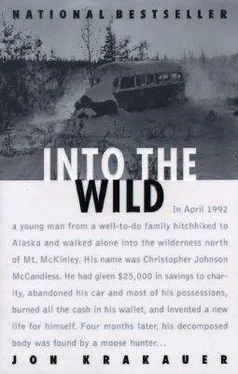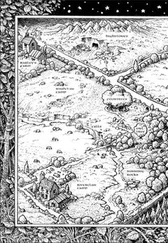It is hardly unusual for a young man to be drawn to a pursuit considered reckless by his elders; engaging in risky behavior is a rite of passage in our culture no less than in most others. Danger has always held a certain allure. That, in large part, is why so many teenagers drive too fast and drink too much and take too many drugs, why it has always been so easy for nations to recruit young men to go to war. It can be argued that youthful derring-do is in fact evolutionarily adaptive, a behavior encoded in our genes. McCandless, in his fashion, merely took risk-taking to its logical extreme.
He had a need to test himself in ways, as he was fond of saying, “that mattered.” He possessed grand-some would say grandiose-spiritual ambitions. According to the moral absolutism that characterizes McCandless’s beliefs, a challenge in which a successful outcome is assured isn’t a challenge at all.
It is not merely the young, of course, who are drawn to hazardous undertakings. John Muir is remembered primarily as a no-nonsense conservationist and the founding president of the Sierra Club, but he was also a bold adventurer, a fearless scrambler of peaks, glaciers, and waterfalls whose best-known essay includes a riveting account of nearly falling to his death, in 1872, while ascending California’s Mt. Ritter. In another essay Muir rapturously describes riding out a ferocious Sierra gale, by choice, in the uppermost branches of a one-hundred-foot Douglas fir:
[N]ever before did I enjoy so noble an exhilaration of motion. The slender tops fairly flapped and swished in the passionate torrent,
bending and swirling backward and forward, round and round, tracing indescribable combinations of vertical and horizontal curves, while I clung with muscles firm braced, like a bobolink on a reed.
He was thirty-six years old at the time. One suspects that Muir wouldn’t have thought McCandless terribly odd or incomprehensible.
Even staid, prissy Thoreau, who famously declared that it was enough to have “traveled a good deal in Concord,” felt compelled to visit the more fearsome wilds of nineteenth-century Maine and climb Mt. Katahdin. His ascent of the peak’s “savage and awful, though beautiful” ramparts shocked and frightened him, but it also induced a giddy sort of awe. The disquietude he felt on Katahdin’s granite heights inspired some of his most powerful writing and profoundly colored the way he thought thereafter about the earth in its coarse, undomesticated state.
Unlike Muir and Thoreau, McCandless went into the wilderness not primarily to ponder nature or the world at large but, rather, to explore the inner country of his own soul. He soon discovered, however, what Muir and Thoreau already knew: An extended stay in the wilderness inevitably directs one’s attention outward as much as inward, and it is impossible to live off the land without developing both a subtle understanding of, and a strong emotional bond with, that land and all it holds.
The entries in McCandlesss journal contain few abstractions about wilderness or, for that matter, few ruminations of any kind. There is scant mention of the surrounding scenery. Indeed, as Roman’s friend Andrew Liske points out upon reading a photocopy of the journal, “These entries are almost entirely about what he ate. He wrote about hardly anything except food.”
Andrew is not exaggerating: The journal is little more than a tally of plants foraged and game killed. It would probably be a mistake, however, to conclude thereby that McCandless failed to appreciate the beauty of the country around him, that he was unmoved by the power of the landscape. As cultural ecologist Paul Shepard has observed,
The nomadic Bedouin does not dote on scenery, paint landscapes, or compile a nonutilitarian natural history… [H]is life is so profoundly in transaction with nature that there is no place for abstraction or esthetics or a “nature philosophy” which can be separated from the rest of his life… Nature and his relationship to it are a deadly-serious matter, prescribed by convention, mystery, and danger. His personal leisure is aimed away from idle amusement or detached tampering with nature’s processes. But built into his life is awareness of that presence, of the terrain, of the unpredictable weather, of the narrow margin by which he is sustained.
Much the same could be said of McCandless during the months he spent beside the Sushana River.
It would be easy to stereotype Christopher McCandless as another boy who felt too much, a loopy young man who read too many books and lacked even a modicum of common sense. But the stereotype isn’t a good fit. McCandless wasn’t some feckless slacker, adrift and confused, racked by existential despair. To the contrary: His life hummed with meaning and purpose. But the meaning he wrested from existence lay beyond the comfortable path: McCandless distrusted the value of things that came easily. He demanded much of himself-more, in the end, than he could deliver.
Trying to explain McCandless’s unorthodox behavior, some people have made much of the fact that like John Waterman, he was small in stature and may have suffered from a “short man’s complex,” a fundamental insecurity that drove him to prove his manhood by means of extreme physical challenges. Others have posited that an unresolved Oedipal conflict was at the root of his fatal odyssey. Although there may be some truth in both hypotheses, this sort of posthumous off-the-rack psychoanalysis is a dubious, highly speculative enterprise that inevitably demeans and trivializes the absent analysand. It’s not clear that much of value is learned by reducing Chris McCandless’s strange spiritual quest to a list of pat psychological disorders.
Roman and Andrew and I stare into the embers and talk about McCandless late into the night. Roman, thirty-two, inquisitive and outspoken, has a doctorate in biology from Stanford and an abiding distrust of conventional wisdom. He spent his adolescence in the same Washington, D.C., suburbs as McCandless and found them every bit as stifling. He first came to Alaska as a nine-year-old, to visit a trio of uncles who mined coal at Usibelli, a big strip-mine operation a few miles east of Healy, and immediately fell in love with everything about the North. Over the years that followed, he returned repeatedly to the forty-ninth state. In 1977, after graduating from high school as a sixteen-year-old at the top of his class, he moved to Fairbanks and made Alaska his permanent home.
These days Roman teaches at Alaska Pacific University, in Anchorage, and enjoys statewide renown for a long, brash string of backcountry escapades: He has-among other feats-traveled the entire 1,000-mile length of the Brooks Range by foot and paddle, skied 250 miles across the Arctic National Wildlife Refuge in subzero winter cold, traversed the 700-mile crest of the Alaska Range, and pioneered more than thirty first ascents of northern peaks and crags. And Roman doesn’t see a great deal of difference between his own widely respected deeds and McCandless’s adventure, except that McCandless had the misfortune to perish.
I bring up McCandless’s hubris and the dumb mistakes he made-the two or three readily avoidable blunders that ended up costing him his life. “Sure, he screwed up,” Roman answers, “but I admire what he was trying to do. Living completely off the land like that, month after month, is incredibly difficult. I’ve never done it. And I’d bet you that very few, if any, of the people who call McCandless incompetent have ever done it either, not for more than a week or two. Living in the interior bush for an extended period, subsisting on nothing except what you hunt and gather-most people have no idea how hard that actually is. And McCandless almost pulled it off.
Читать дальше












